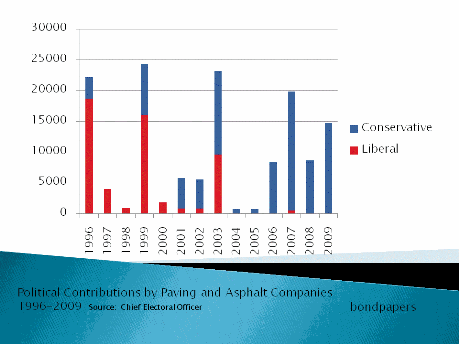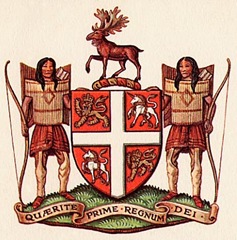He quoted from a book by Wally Read and L.J. Cole. The quote runs down opponents of the Bay d’Espoir megaproject in the 1960s as ignorant, blind or politically motivated people of dubious character who lacked the foresight to undertake the marvelous project.
You can hear the whole call courtesy of Dave Adey. Before going any farther, take a second and listen to Tom in all his persuasive majesty. Then, when you are finished being awestruck, come back to these scribbles.
Fair warning: if you are awestruck at Tom, you’ll be gobsmacked by the end of this post.
Now if you don’t know – and your humble e-scribbler didn’t know until he went looking – that book was in fact no book at all. It was a 28 page pamphlet produced by the Newfoundland and Labrador Power Commission in 1972 to mark the inauguration of their new power plant at Bay d’Espoir. The Commission was the forerunner of Newfoundland and Labrador Hydro.
And if the words Marshall read sounded familiar, if they sounded as though you heard them before, if it struck you that the language used by Read and Cole resonated in a way you may have heard before, if the sentences seemed to come with bow tie and dark-rimmed spectacles, then you would be right.
The visionary Read and Cole were praising, the champion-in-chief of modernity, progress, and the future of His People, the one who stood out among the one or two the authors obliquely referenced in the text was none other than the Only Living Father of Confederation at the time.
Yes, Joe Smallwood.
So right off the bat, you have a fellow who got his current job as part of a crowd who campaigned against foolish megaprojects, gigantic wastes of money and enormous give-aways quoting favourably about the fellow who was chief among their targets.
And the fellows of low character and small minds the two others lambasted were Marshall’s political predecessors in the provincial Conservatives.
And if the full story be told, Tom probably campaigned for some of them and fulminated against Smallwood himself four decades ago.
Now if you are feeling a bit weak in the knees, we can all wait for you to catch your breath.
This is only the beginning.
You see, we are not dealing here with mere irony.
No.
That would be too common a theatrical device for people of such enormous vision and unparalleled ability.
This, my friends, is the stuff of Greek tragedy.
If someone among the current administration plucked out his own eyes after slaughtering his own father, bedding his sister, and marrying his own mother, you could not have anything more fundamentally twisted, demented and frigged in the head than Tories justifying themselves by borrowing words of praise for Joe Smallwood.
The whole thing enters another dimension when you realise that Bay d’Espoir was conceived and built in the 1960s not as a simple project to meet identified need as Tom Marshall would have you believe.
No, sir.
Bay d’Espoir was the centrepiece of yet another scheme by which the ratepayers of Newfoundland would give megawatts of power at bargain basement prices to create not one, not two, not three or even four or five, but something like eight new industries.
A paper mill for the east coast.
A hockey stick factory.
A refinery.
A petrochemical plant.
A phosphorus plant.
And on and on it went.
Joe Smallwood gives the thing a couple of paragraphs at the bottom of page 375 and the top of page 376 in I chose Canada. After reciting the efforts to get companies to take power for the project, Smallwood writes on page 376:
The killer was the cost of the transmission line, but we agreed to build the line and charge Brinco nothing for it until after the enterprise had begun to make money.You won’t find the full story of the Bay d’Espoir saga in the Read and Cole monograph of in Smallwood’s memoir. You’ll get a much better sense of the dubious economics of the whole affair in a paper done in
Bay d’Espoir was supposed to do magical things. Many of the same claims of magic Tom Marshall and his friends are using for Muskrat falls are the same ones Smallwood and his associates used for their mega-failures. As it turned out, the only new industry Bay d’Espoir attracted was the phosphorus plant at Long Harbour. The scheme to attract new industry by providing heavily discounted electricity to industries was a complete bust.
Proponents of megaprojects grossly exaggerate the benefits and grossly underestimate the risks, in case you haven’t heard that one before.
Skip ahead 40 years and you have tom Marshall marvelling at how history is repeating itself. Indeed it is, except not in the way Marshall supposes. He and his colleagues are on the wrong side of the story.
Now just so that there is no one with any sense who thinks this is a conspiracy, Randy Simms did a grave disservice to his audience during the conversation with Marshall when he tried to turn the arguments against Muskrat Falls into something they aren’t.
Undoubtedly, Tom Marshall and Kathy Dunderdale sincerely believe they are doing the right thing. They have convinced themselves that this is the way to go, just as Smallwood did in the 1960s repeatedly. Just as Brian Peckford and his crowd did with the cucumber factory.
Desperation makes politicians – even normally sensible ones like Tom Marshall - do strange things.
But make no mistake about it: Muskrat Falls has absolutely nothing to do with a power need on the island just as surely as the Bay d’Espoir project and nothing to do with consumer power needs. We know this because Nalcor could not produce figures that demonstrate their forecasts of an impending power shortage are real.
We also know it because this project has never, ever been justified on the basis of urgent need.
Tom Marshall and his colleagues pushed the development of the Lower Churchill in the beginning as a way to make money by selling power to people outside the province.
Go back to January 2005.
Not a single peep about a need for electricity on the island.
The joint review panel found the same thing.
Muskrat Falls is not about need.
It is about want.
More specifically, it is about a political want. Danny Williams wanted to cap off his term by saying he had a deal. the economics of it had long since vanished. The project – as originally planned – simply could not fly. So he cut a deal for something that would look good in theory but that fails when anyone with half a clue looks closely at it.
Williams’ political want for an excuse to cover his exit became the political want of his successor to have something to tide her through an election.
We know this project is not driven by public need because neither Nalcor nor Tom Marshall nor anyone else pushing it ever more frantically down our collective throat has been able to give a simple, consistent and factual set of answers to a simple set of questions. They squirm and they dodge and they toss out red herrings and they attack their critics.
Tom and his associates spent two years with a hand-picked panel of five intelligent, sensible people looking over this Muskrat Falls thing. Those five people told Nalcor that the company had not made its case.
Not once, mind you, but twice.
Those five people on the joint federal-provincial review panel recommended giving the whole thing to someone without a vested interest in the project in order to make sure that all the evidence was there.
That’s as serious an indictment of Nalcor’s poor performance as one could get.
So the people Tom Marshall claims know so much about electricity needs and megaprojects couldn’t knock off a two year review process successfully on the crucial component: the need for it in the first place to meet local energy demand.
And ultimately we know this project is driven by politics because of Tom Marshall’s obvious desperation that he would praise the Churchill Falls development and Bay d’Espoir as models to follow.
There is obviously no claim so ridiculous and no argument so transparent that Marshall and his colleagues would not toss it out to try and fight off the public worry about Muskrat Falls and what the project will do to electricity rates and the public debt.
Somewhere in the Great Beyond, Joe Smallwood is looking down on this all. He is sitting with John Shaheen and O.L. Vardy while Valdmanis plays waiter and freshens their drinks every now and then. They are kicked back enjoying fine cigars and letting the sand scrunch between their toes.
And on that magnificent Panamanian beach beyond all time and care, Joe is shitting himself laughing.
He is crapping his Bermudas at Tom and Kathy and Danny.
The rest of us could join him in the chuckle too. We could bust open our pants with a hearty belly laugh. We could do that if only we were not faced with the embarrassing spectacle of Tom Marshall’s desperation.
We could maybe even manage a smile, were it not for the fact that – if the province’s Conservatives and New Democrats get their way - we will be footing the bill for yet another megaproject give-away to rival the greatest ones of the last century.
And we will have to listen as our children and grandchildren as they ask us over and over again how some people could have become so utterly deluded that they could make the same miserable mistake twice inside a half century and use the first fiasco as proof of the genius in the second.
We could laugh except that some of us cannot explain it.
We only know that we will be paying for their folly.
Again.





